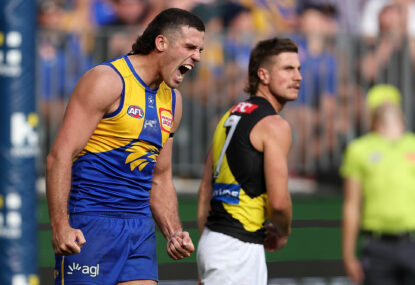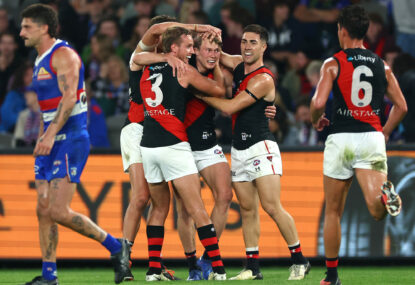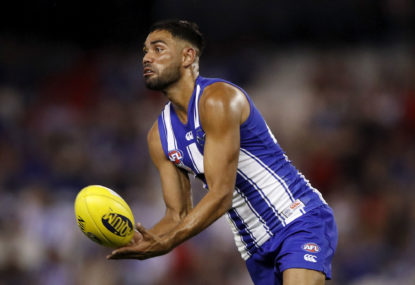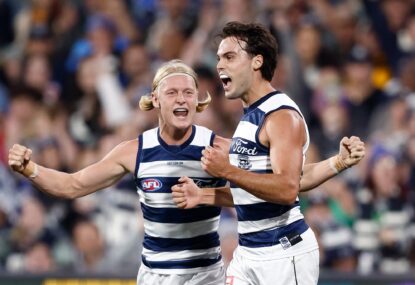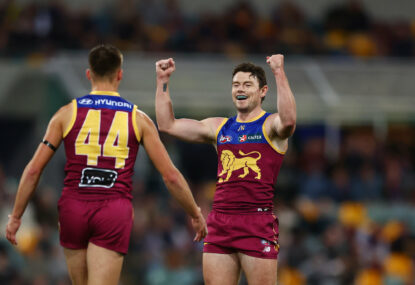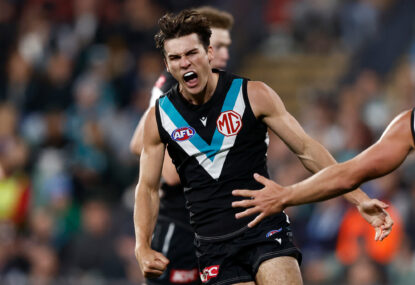Following on from an embarrassing 16-goal exit from the 2009 finals series at the hands of the Adelaide Crows, Essendon entered the new decade in semi-promising fashion, winning five of their opening ten matches in 2010.
A shocking second half of the season yielded just two victories, with the Bombers slumping to a 14th-place finish. Matthew Knights was promptly sacked as coach following a 38.06 per cent winning record over three seasons, with club legend James Hird taking his place.
Hird would have immediate success, taking Essendon back to September, but another hefty loss, this time to arch-rivals Carlton, saw them dismissed from the premiership race. An incredible start to the 2012 season had the Bombers sitting just one game from the top spot at the end of Round 13, but another terrible fade out saw Essendon slump to 11th position.
On the eve of the 2013 season the Bombers were investigated by the Australian Sports Anti-doping Agency (ASADA) and the World Anti-doping Agency (WADA) over the legality of its supplements program conducted during the previous year. After a 14-win season that resulted in a seventh-place finish, the AFL would relegate the Bombers to the bottom ten after the first phase of the investigation highlighted a wide range of governance and duty-of-care failures relating to the supplements program.
Hird was banned for 12 months and Essendon lost the rights to their first and second-round draft selections in both the 2013 and 2014 drafts.
Senior assistant coach Mark Thompson would step in to take the reins for the 2014 season, guiding the Bombers to another finish in seventh position, with Essendon meeting North Melbourne in the finals. Despite leading by 33 points early in the second half, Essendon were overrun, bowing out of yet another finals campaign without a win.
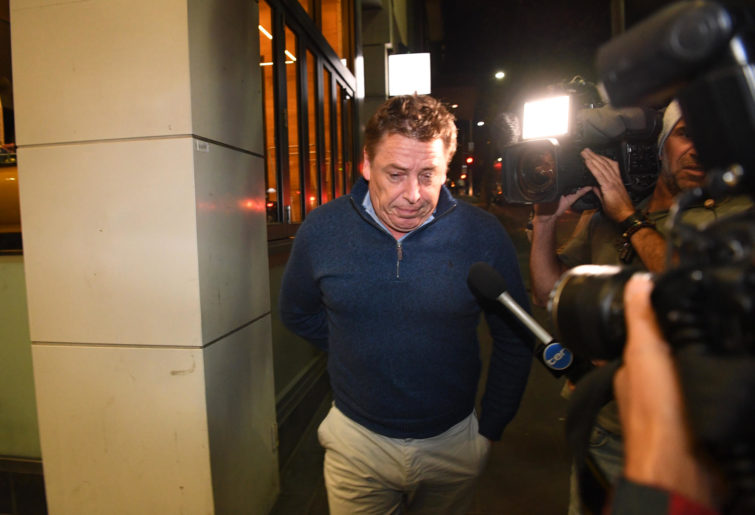
(AAP Image/James Ross)
Hird returned to the helm in 2015, but it would be a disaster on-field for the Bombers, with just six wins and a 15th-place finish. A hefty loss in Round 20 ended Hird’s tumultuous tenure, with Matthew Egan taking over as caretaker for the final three rounds. Former West Coast premiership coach John Worsfold would take over after two seasons out of the game.
The second phase of the investigation into the supplements saga saw the 34 players involved found not guilty. However, an appeal by WADA to the Court of Arbitration for Sport overturned the verdict, resulting in 12 players still on the Essendon list being banned from participating in the 2016 season. As a result, the Bombers were permitted to recruit ten top-up players from state leagues or its own VFL club.
Missing stars such as Dyson Heppell, Jobe Watson, Cale Hooker and Michael Hurley, Essendon struggled, winning just three games and finishing on the bottom of the ladder for the first time since 1933.
With the return of those senior players, Worsfold took Essendon back to the finals in 2017, but they were again found wanting in September, losing to the Swans by 65 points. A heavy recruiting drive over the summer saw the Bombers highly touted going into the 2018 season, but they would ultimately finish in 11th position.
With the arrival of Giants star Dylan Shiel ahead of 2019, Essendon would scrape into eighth position, setting up an elimination final against West Coast in Perth. The Bombers’ drought without a finals win extended to 15 years, with the Eagles winning easily.
At the end of the 2019 season it was announced that 2020 would be Worsfold’s final year as coach, with assistant Ben Rutten to take the reins after that.
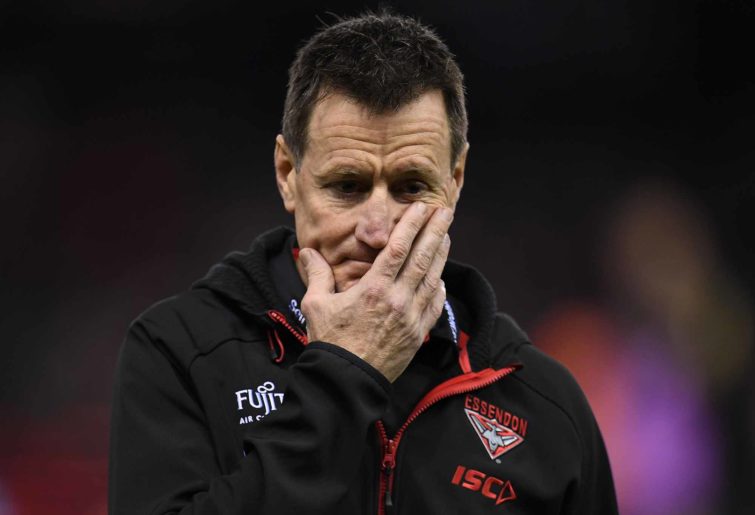
(AAP Image/Julian Smith)
Best wins
Round 15, 2011 – Essendon 18.7.115 defeated Geelong 16.15.111 (Marvel Stadium)
With a six-game losing run against Geelong, the Bombers entered their Round 15 clash with the unbeaten, top-of-the-table Cats as rank outsiders. Geelong started as expected, kicking the first three goals, before a defiant Essendon outfit responded with six majors in a row. By early in the third quarter the Bombers had skipped out to a 33-point lead. But Chris Scott’s men would come again, getting within four points late in the match. A magnificent piece of play along the boundary line in Essendon’s attacking half would result in a goal to Jake Melksham, sealing a special victory for the red and black army.
Round 3, 2013 – Fremantle 9.14.68 defeated by Essendon 10.12.72 (Subiaco)
With Essendon embroiled in the midst of a doping scandal, all eyes were fixated on James Hird’s men as they flew west looking to start the season with three consecutive wins. In their road was a Fremantle outfit also with two wins from their opening two matches, and they looked the far better side early, leading by six goals at half time. With just one goal from the opening half, Essendon slammed on five in a row to get back into the contest. With both sides swapping the lead in the final quarter, a late goal to Paddy Ryder delivered an emotion-charged win for the Bombers and a 3-0 start to the season.
Round 2, 2015 – Essendon 12.6.78 defeated Hawthorn 11.10.76 (MCG)
Looking to break a run of five consecutive losses against fierce rivals Hawthorn, the Bombers led for the majority of the game, with an early goal in the third quarter extending the advantage to 28 points. However, the reigning champions responded, slamming on eight of the next nine goals. Now facing a 16-point deficit late in the match, Essendon responded with the final three majors of the match, the last of which to Cale Hooker with only a minute remaining on the clock. Hearts remained in the mouths of the 60,000 crowd as Luke Breust took possession of the ball in the Hawthorn forward line, with the siren ringing as the Hawks goalkicker streamed into goal.
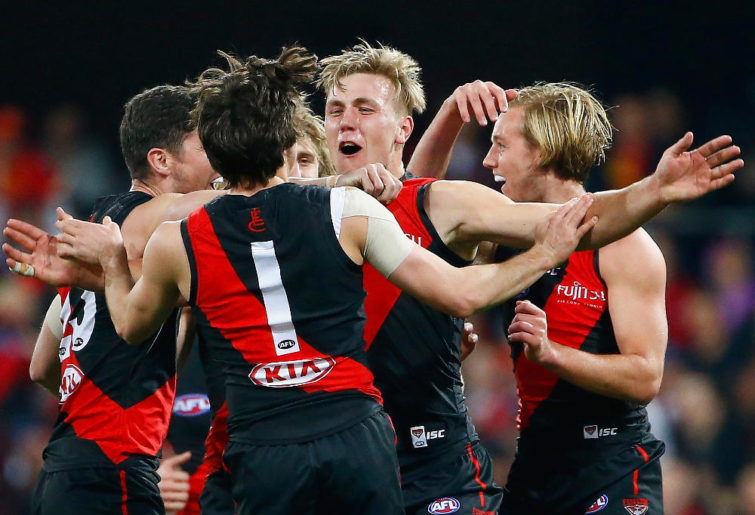
(Jason O’Brien/AFL Media/Getty Images)
Worst losses
Round 21, 2012 – Essendon 8.12.60 defeated by Carlton 24.12.156 (MCG)
A scintillating start to the 2012 season had Essendon well-placed to make a second consecutive finals campaign, sitting just percentage out of the top four at the end of Round 16 with an 11-4 record. However, a horrible capitulation resulted in the Bombers clinging to their spot in the top eight. On the back of a four-game losing streak Essendon took on rivals Carlton at the MCG, who were already out of the September equation.
Desperately needing to bank a win, the Bombers conceded 15 goals in a dismal first half. The rampant Blues would go on to record a monster 96-point win, all but ending any hope Essendon had of reversing their on-field fortunes. The Bombers would finish the 2012 campaign on the back of seven straight losses, missing the finals by three games.
Elimination final, 2014 – North Melbourne 14.9.93 defeated Essendon 12.9.81 (MCG)
Back in September after being relegated from the finals in 2013, Essendon met North Melbourne in front of nearly 80,000 fans on a Saturday night at the MCG. Looking to break a ten-year run without a win in a final, the Bombers started well, leading by as much as 33 points early in the second half. However, first-year Kangaroo Ben Brown led a blue and white fightback as the Roos piled on seven majors in the third term. After surrendering the lead in the final quarter, Essendon got their noses back in front thanks to a Paddy Ryder goal. However, North came again, kicking the final two majors of the match to seal a memorable win, continuing Essendon’s miserable record in September.
Round 21, 2019 – Essendon 4.9.33 defeated by Western Bulldogs 21.11.137 (Marvel Stadium)
After a five-game winning streak, Essendon appeared to be hitting another finals campaign in great form. However, an eye-opening clash with Port Adelaide in Round 20 resulted in a heavy loss. A week later the Bombers took on the tenth-placed Western Bulldogs. After booting the opening goal through Dylan Shiel in the opening 20 seconds of the match, Essendon couldn’t kick another major for an incredible 108 minutes. A masterclass from Luke Beveridge’s men saw the Bulldogs pile on 21 consecutive goals – just two short of the VFL/AFL record – as they brought up the first and only win by triple figures by any side in 2019. It would be the death knell for Essendon’s season, winning just one more game as they bowed out of another finals series without a whimper.
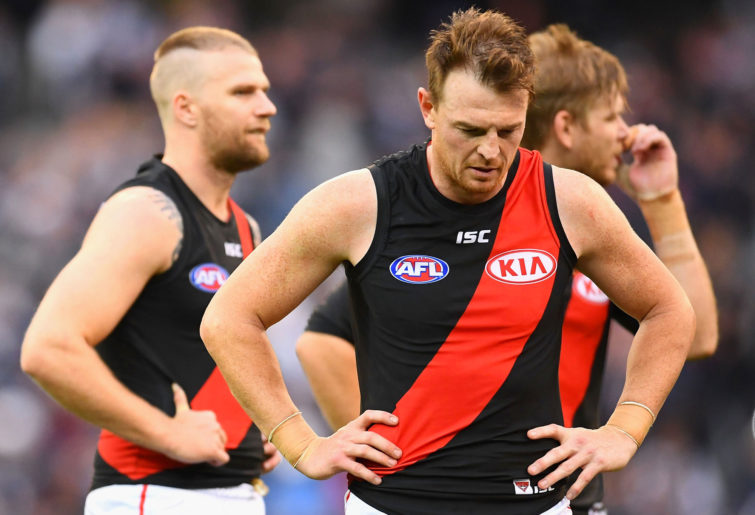
(Quinn Rooney/Getty Images)
Moments that shaped the club
Moving to Tullamarine
After over 90 years of both operating and playing home games at the Essendon Recreation Reserve, otherwise known as Windy Hill, the Bombers opted to build a new training facility in the suburb of Melbourne Airport in 2010. A 37-year lease was signed, with Essendon moving their primary training base and administration facilities in 2013. Windy Hill is still used for its VFL side’s home games, while a social club and merchandise store still remains on site. Essendon’s lease at Windy Hill is set to expire in 2031.
Supplements scandal
Just prior to the beginning of the 2013 season, Essendon contacted the Australian Sports Anti-doping Authority (ASADA) to investigate the possible use of unapproved supplements during the 2012 campaign. The ensuing investigation, which took a number of years, would result in the Bombers being barred from the finals series in 2013, the loss of their first and second-round draft picks in that year’s draft as well as 2014’s, a $2 million fine and a 12-month suspension for coach James Hird, among other penalties.
A second phase of investigation ended up seeing 12 Essendon players suspended for the 2016 season, while four ex-Bombers then at other clubs were also banned from playing. As a result the Bombers were permitted to recruit up to ten players from state leagues or their own VFL side. A weakened Essendon outfit consisting of top-up players and inexperienced youngsters would win their first wooden spoon in 83 years. Ex-captain Jobe Watson was forced to hand back the Brownlow Medal he won in the year of Essendon’s supplements use. The return of the banned players resulted in a return to finals in 2017.
The Worsfold era
After James Hird’s controversial tenure as coach came to an end late in 2015 the Bombers sought an experienced head to take his place. After two years out of the game following a long stint with the West Coast Eagles, John Worsfold returned to the hot seat wearing red and black. After ‘winning’ the wooden spoon in his first year in charge, Worsfold took Essendon to September in both 2017 and 2019, with both campaigns resulting in heavy elimination final defeats. Worsfold also saw the Bombers embark on a bold recruiting drive, picking up Western Bulldogs premiership star Jake Stringer, Gold Coast speedster Adam Saad and Giants midfielder Devon Smith at the end of 2017. A year later Giants star Dylan Shiel opted for a move to Windy Hill and came second in the Crichton Medal in his first year as a Bomber.
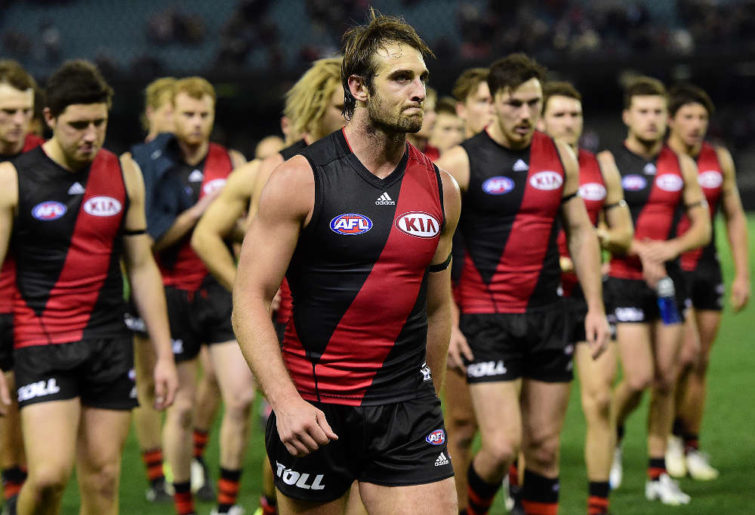
(AAP Image/Julian Smith)
Best 22 of the decade
Back pocket: Mark Baguley
Picked up as a mature-age rookie, Baguley made the transition from VFL football with Frankston to AFL level with the Bombers easily. After making his debut in 2012, he would go on to play 134 matches, finishing in the top ten of the Crichton Medal on two occasions. After many of his teammates were suspended in 2016 due to the doping saga that hit the Bombers, Baguley was named vice-captain. In his final two years before retirement Baguley spent more time up forward, kicking 32 of his 35 career goals.
Full back: Dustin Fletcher
Having finished the 2009 season with 312 games under his belt, it’s remarkable to think the 34-year-old Fletcher would go on for another six seasons before hanging up the boots on an illustrious career. His performance on the field certainly wasn’t waning, registering two top-five finishes in the club best and fairest during the 2010 decade. After reaching the rare 400-game milestone in 2015, Fletcher unfortunately injured his groin and was forced to retire at the ripe old age of 40, becoming the second-oldest player in the history of the league to play at the top level.
Back pocket: Michael Hibberd
Similar to Baguley, Hibberd joined the Bombers as a mature-age selection from the Frankston Football Club. A running defender with a terrific kick, Hibberd played 84 matches in the red and black, finishing in the top four of the Crichton Medal on two occasions. After being forced to sit out the 2016 campaign due to Essendon’s supplements scandal, Hibberd requested a move to Melbourne.
Half back: Conor McKenna
The Bombers took a punt on the skilful Gaelic footballer from Ireland at the end of 2014 and it worked out beautifully. The past three seasons have seen McKenna establish himself in the team’s best 22 as a line-breaking defender. After finishing in the top ten of the club best and fairest for the first time in 2018, McKenna managed a top-four finish this season.
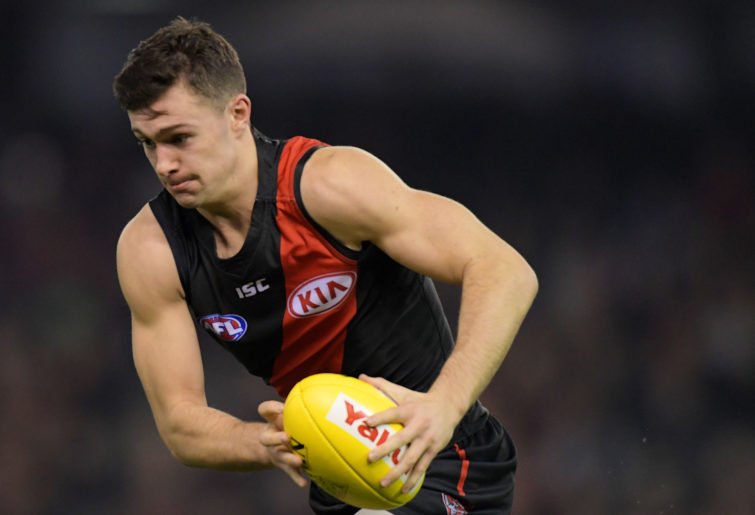
(AAP Image/Tracey Nearmy)
Centre half back: Michael Hurley
Has been one of Essendon’s most consistent performers across the decade, playing 169 matches since the start of 2010. Up until 2013 Hurley was used predominantly as a forward, kicking 89 goals across the space of four years. A switch to a permanent role in the backline did wonders for Hurley’s career in 2014, resulting in two All Australian selections in 2015 and then again in 2017 following his one-year ban. While Hurley has never won a Crichton Medal, he has finished in the top ten on seven occasions, including in 2015 when he was runner-up to Cale Hooker.
Half back: Andrew McGrath
As a result of Essendon’s wooden spoon in 2016 the Bombers were gifted the first pick in the national draft. They used that on speedy midfielder Andrew McGrath, who made an instant impact in his first year in the red and black. McGrath became Essendon’s first Rising Star winner since Dyson Heppell in 2011, while he was also named the AFL Players Association best first-year player.
Wing: David Zaharakis
No-one has played more games for the Bombers during the 2010 decade than Zaharakis, who won the Crichton Medal at the young age of 21 in 2011, just his third season on the list. Unlike many of his teammates, Zaharakis did not opt to partake in Essendon’s supplements program, meaning he was free to play in the 2016 season. Along with his 2011 win, Zaharakis has finished in the top ten of the best and fairest on six occasions.
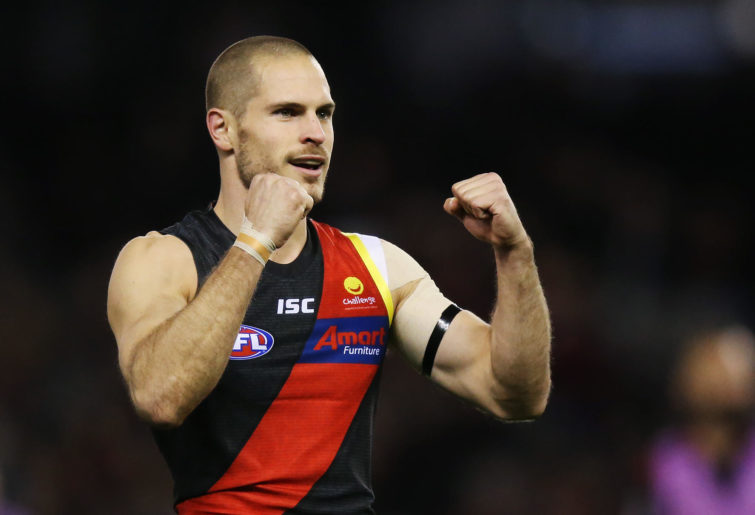
(Michael Dodge/Getty Images)
Centre: Jobe Watson (captain)
Watson began the 2010 decade as the new captain of the Essendon Football Club, having immediate success in the role with his second consecutive Crichton Medal. That year he would also finish in the top ten of the Brownlow Medal, before winning the award after a dominant 2012 campaign that also netted him another best and fairest gong. Unfortunately, due to the supplementals scandal that rocked the club, the two-time All Australian from 2012 and 2013 was forced to hand back his Brownlow at the end of 2016, a year in which he was banned from participating for the Bombers. No longer captain, he returned for a final year in 2017, retiring after 220 games, 126 of them coming in the decade.
Wing: Brendon Goddard
With the AFL introducing a free agency period at the end of 2012, Goddard became the first player to switch clubs under that method after an illustrious career with St Kilda, joining the Bombers on a four-year contract. It was a move that brought instant personal success for the star, who won the Crichton Medal in his debut season in the red and black. It would be one of six top-ten finishes Goddard would achieve in his 129 games in the red and black. In 2016 Goddard captained the club after Jobe Watson was suspended during Essendon’s supplements scandal. At the end of 2018 Essendon refused to offer Goddard a contract for a seventh season, resulting in his retirement after 334 matches.
Half forward: Anthony McDonald-Tipungwuti
The man affectionately known as ‘Tippa’ has been a revelation since joining the Bombers from their VFL list in the 2015 rookie draft. Since his debut at the start of the 2016 season, McDonald-Tipungwuti has played all but one game, finishing in the top ten of the Crichton Medal in each of his four seasons thus far. He has been a valuable goalkicking option for the Bombers in recent years, averaging over 30 goals a season from his last three campaigns.
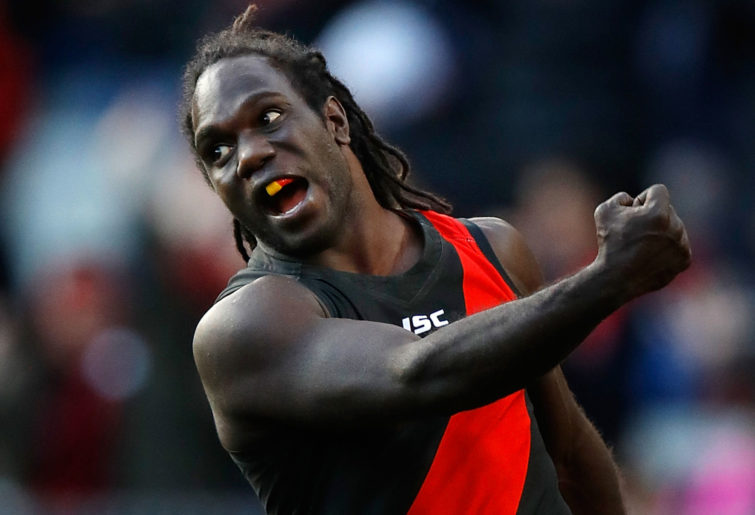
(Michael Willson/AFL Media/Getty Images)
Centre half forward: Joe Daniher
Essendon’s best forward from the decade, Daniher led the Bombers goalkicking every year between 2014 and 2017, winning All Australian selection in the latter year for a monster 65-goal haul. Season 2017 also saw Daniher win his first Crichton Medal after coming runner-up the year prior, while he also won the Anzac Day medal and the AFL’s mark of the year award that season. Daniher’s last two seasons have been ravaged by groin injuries, resulting in just 11 games and 15 goals. He caused a media storm at the end of 2019 when he announced a desire to switch to the Sydney Swans, but a trade could not be completed.
Half forward: Ben Howlett
A mature-age rookie selection from Peel Thunder in the WAFL, Howlett was a valuable inside midfielder for the Bombers across 124 matches, finishing in the top ten of the best and fairest three times. Howlett was also handy around the goals, kicking 58 in his career, including a career-high five majors in the 2014 Dreamtime at the G game against Richmond. Following his suspension in the 2016 season Howlett managed just seven games and was subsequently delisted.
Forward pocket: Orazio Fantasia
A speculative draft pick from 2013, Fantasia has blossomed into a focal part of Essendon’s attacking half in recent seasons. A breakout season in 2016 resulted in the first of two consecutive top-ten finishes in the best and fairest, with Fantasia announcing himself as one of the best small forwards in the league in 2017 with a 39-goal haul. Injuries have restricted the talented forward to just 28 games and 40 goals in the past two seasons.
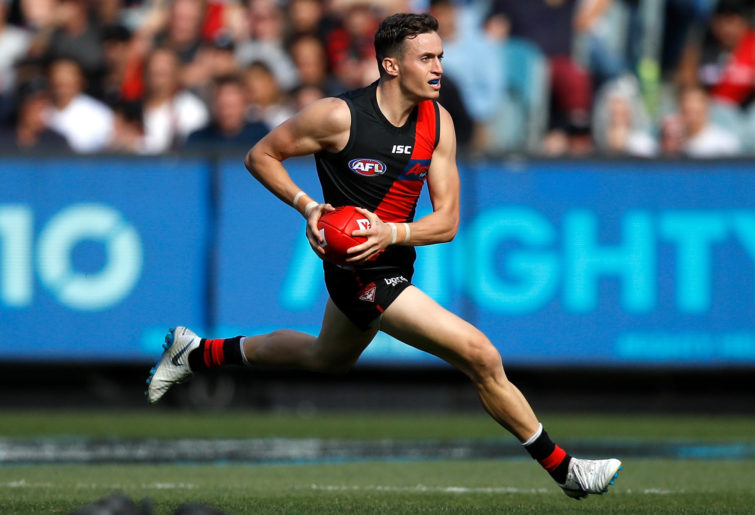
(Dylan Burns/AFL Photos/Getty Images)
Full forward: Cale Hooker
The decade didn’t get off to a great start for Hooker, infamously known as the struggling Essendon player who tried to run down Lance Franklin as he kicked the 2010 goal of the year. Since then he has become a terrific player for the Bombers both down back and up forward. A breakout 2014 season resulted in Hooker being named in the All Australian team in the back pocket before winning his first Crichton Medal in 2015. After a year out of the game due to suspension, Hooker returned in 2017 as a dangerous goalkicking option, booting 41 majors. His past two years have seen him stationed in defence more often, but he still remains an ace up the sleeve for John Worsfold.
Forward pocket: Stewart Crameri
Recruited out of the Bendigo Bombers in the VFL, Crameri played three matches in his debut season of 2010 before having a breakout 2011 campaign. He led Essendon’s goalkicking for three consecutive years, kicking 96 goals across 57 games, resulting in two top-ten finishes in the Crichton Medal. At the end of 2013 Crameri was traded to the Western Bulldogs.
Ruckman: Paddy Ryder
Just gets the nod over Tom Bellchambers for a spot in the starting 18. Ryder was a highly damaging ruckman in the first half of the decade for the Bombers – he was not only able to give first use to his midfielders, but he was also able to float forward and be a valuable goalkicking option. In five seasons between 2010 and 2014, Ryder played 97 games and kicked 95 goals, finishing in the top ten of the best and fairest on three occasions. At the end of 2014 Ryder requested a trade to Port Adelaide.
Ruck rover: Dyson Heppell
A brilliant debut season in 2011 saw Heppell become the first Essendon player to win the Ron Evans Medal as the league’s rising star. Since then the dreadlocked midfielder has become captain of the club, taking over from Brendon Goddard after returning from his 2016 suspension. Heppell has finished in the top ten of the Crichton Medal eight times, with six of those resulting in podium placings. That includes his victory in 2014, a year in which he also made his maiden All Australian side.
Rover: Zach Merrett
One of the best young talents to walk through the doors at Tullamarine, Merrett has become a bona fide star of the competition after six seasons at the senior level. Following the mass suspensions of many of his older teammates in 2016, Merrett led the Essendon midfield admirably, resulting in his first Crichton Medal and a top ten finish in the Brownlow Medal. That year Merrett became the third-youngest player in Essendon’s history to captain the club, standing in for usual skipper Brendon Goddard for two games. Merrett made his first All Australian side in 2017 before claiming another club best and fairest award in 2019.
Interchange: Brent Stanton
An often-maligned player, Stanton was a highly valuable midfielder for the Bombers across his 255 games, 134 of them coming in the 2010 decade. Between 2010 and 2015 Stanton finished in the top ten of the Crichton Medal every year, including a runner-up placing in 2011. Following a suspension for the 2016 season, Stanton returned for seven games in 2017 before announcing his retirement.
Interchange: Tom Bellchambers
The mobile tall has led the Essendon ruck division when fit since Paddy Ryder’s departure at the end of the 2014 season. Also a handy goalkicker, Bellchambers kicked a career-high 28 goals from 18 games in the 2013 season. In total Bellchambers has played 120 games since the start of the decade, finishing in the top ten of the Crichton Medal once.
Interchange: Jake Melksham
A top ten selection at the national draft in 2010, Melksham played 114 games across six seasons with the Bombers, kicking 57 goals. He managed two top-ten finishes in the Crichton Medal, including a top-five placing in 2013. At the end of 2015 Melksham requested a trade to Melbourne, but he would miss the entire 2016 season due to a suspension for his involvement in Essendon’s supplements scandal.
Interchange: Heath Hocking
The hard-nosed midfielder played 103 games in the 2010 decade, notching three top-ten finishes in the Crichton Medal, including a runner-up placing in 2010. Hocking lost his place in the senior side towards the end of his career, playing just seven games in his last three seasons, including 2016 when he was suspended for the year.
Are the Bombers placed better or worse going into the new decade compared to ten years ago?
Better, but the monkey on Essendon’s back at the end of 2009 has now grown into a silverback gorilla, with the club’s last win in a final now over 15 years ago. After a heavy recruiting drive in the last two seasons, the Bombers are well-placed to attack the new decade, with Ben Rutten set to take over from John Worsfold as the new senior coach in 2021. But until Essendon can finally taste victory in September again, the AFL’s most successful team will continue to be one of the biggest disappointments on the field.






































































































